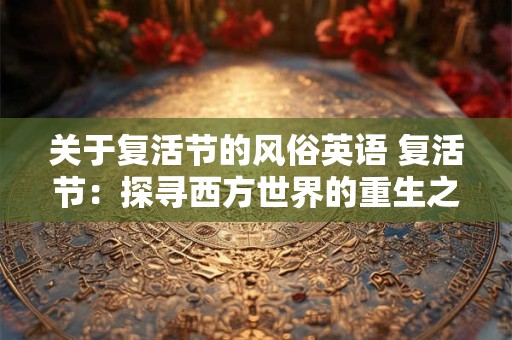As the hues of spring paint the landscape with a burst of life, the festival of Easter unfolds, a time-honored tradition steeped in mystery and symbolism. This ancient celebration, deeply rooted in Western culture, commemorates the resurrection of Jesus Christ and is marked by a myriad of customs and rituals.

The Significance of Easter
Easter holds immense importance in Christianity, as it commemorates the resurrection of Jesus Christ on the third day after his crucifixion. The resurrection is seen as a symbol of hope, renewal, and eternal life, offering believers a sense of comfort and reassurance. The festival also signifies the triumph of good over evil, and light over darkness.
The Story of Easter
The story of Easter begins with the Last Supper, where Jesus shared a final meal with his disciples. Following this, he was betrayed by Judas Iscariot and arrested by the Romans. Jesus was subsequently crucified and died on a cross, a poignant and enduring image of suffering and sacrifice. On the third day, according to the Bible, Jesus rose from the dead, triumphing over death and sin.
Easter Eggs: A Symbol of Rebirth
One of the most iconic symbols of Easter is the egg. The egg represents new life and rebirth, a fitting metaphor for the resurrection of Jesus. During the festival, egg hunts are a popular activity, especially among children. Participants search for brightly colored eggs, often filled with candy or small gifts, hidden by adults. This tradition symbolizes the search for hope and new beginnings.
The Easter Bunny: A Mischievous Symbol
Another beloved figure associated with Easter is the Easter Bunny. Although the origin of the Easter Bunny is shrouded in mystery, many believe it has its roots in ancient German folklore. The bunny is thought to deliver eggs and candy to children on Easter morning, symbolizing fertility and abundance. Today, the Easter Bunny is a symbol of joy and celebration.
Easter Egg Decorations
Easter egg decorations are another delightful tradition. Eggs are often dyed in various colors, such as red (for blood), blue (for hope), and yellow (for happiness). Decorating eggs can be a creative and engaging activity for the entire family, fostering a sense of community and togetherness.
The Easter Sunday Service
On Easter Sunday, Christians gather for special church services to celebrate the resurrection of Jesus. These services often include readings from the Bible, hymns, and sermons. The atmosphere is one of joy and reverence, as believers reflect on the significance of Easter and the hope it brings.
Easter Bonnets and New Clothes
It's a custom for many Christians to wear new clothes on Easter Sunday, as a symbol of new beginnings. Women often adorn themselves with Easter bonnets, colorful and festive headpieces that add to the celebratory atmosphere. This tradition signifies the shedding of old habits and the embrace of new opportunities.
The Easter Parade
In some areas, the Easter Parade is a lively and colorful event. Participants dress in their finest attire, often incorporating floral motifs, and parade through the streets, showcasing their Easter finery. The parade is a celebration of spring and a chance for communities to come together and enjoy the festivities.
Conclusion
Easter, with its rich history and symbolism, continues to be a time of joy and renewal for many around the world. From egg hunts to special church services, the customs and traditions of Easter are a testament to the enduring power of hope and the belief in the triumph of good over evil. As spring blossoms, so too does the spirit of Easter, reminding us all of the beauty and mystery that lie within the cycle of life and rebirth.
